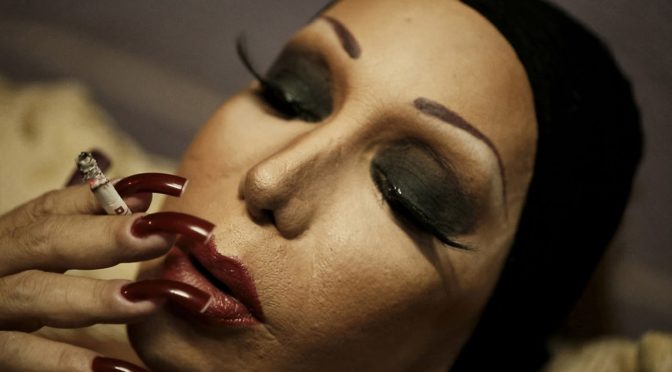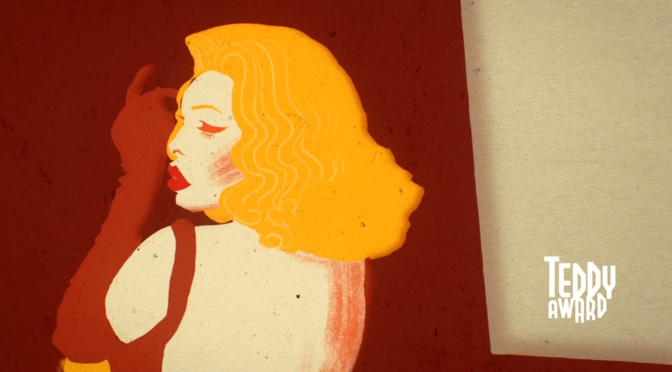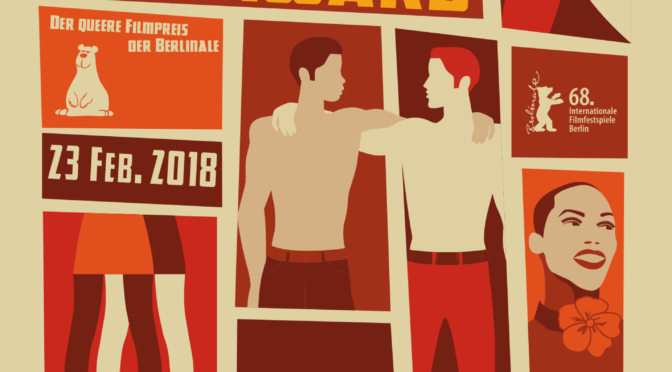Evangelina Kranioti’s ethereal documentary ‘Obscuro Barroco’, following the experiences of transgender personality Luana Muniz as she navigates the streets of Rio de Janeiro’s Carnival, promises “a story of a calm darkness”. But across the film we follow a movement from night to day, with the closing scenes of the film depicting beams of sunlight stretching across the skyline. The transformation of the city from darkness to light offers a symbolic parallel to the metamorphosis of gender seen in the film, and more generally to the growing visibility of the trans population in this region. Just as the trans protagonist steps into Rio’s dawn, numerous trans artists are emerging onto the Brazilian art scene. Kranioti’s documentary is the first of a number of Brazilian and Latin American films submitted to the Teddy Award 2018, celebrating trans and queer culture. ‘Bixa Travesty’, directed by Kiko Goifman, is a tender biopic of Brazilian transgender singer Linn da Quebrada, and ‘La omisión’, Argentinian filmmaker Sebastián Schjaer’s first full-length fiction film, portrays the struggles of a young transient worker. The increasing representation of trans people on the big screen is matched by developments on the small screen. 2017 saw the production of TV Series, ‘Edge of Desire’, a soap opera chronicling the transition of a transgender man that draws in roughly 50 million viewers per night[1]. Broadcast on Brazilian TV network, Globo, the show is the nation’s first ever soap opera featuring a transgender character. Similarly, transgender singer Pabllo Vittar broke the Brazilian record for YouTube view with their song Sua Cara this year[2], and British transgender playwright Jo Clifford’s show, ‘The Gospel According to Jesus, Queen of Heaven’, which imagines Jesus as a trans woman, continues to be a sell-out hit at theatres across the country since its arrival in 2016[3]. Brazil is home to a large community of transgender people, added to which are the members of what is known as the country’s “third sex”, travestis (individuals designated male at birth, but who live a feminine gender identity). Its annual Pride parade in Sao Paolo, which attracted an estimated 3 million attendants this year[4], is the largest in the world. The country is also seen as something of a beacon when it comes to the legal rights of LGBT people. The government was one of the first to work with LGBT rights organisations to offer free medical care to HIV/AIDS sufferers, and 2013 saw the legal recognition both of same-sex marriage and of the right to change a person’s name and gender marker on some government-issued identification documents[5]. It is only right, then, that the growing legal realisation of trans identities is mirrored in the realisation of those identities in Brazilian art. But there is a looming shadow over these advancements; with more visibility in the public sphere comes louder and more violent hostility. In the art world that hostility translates to societal censorship, with two Brazilian exhibitions of queer art this year being shut down early thanks to right-wing and conservative Christian protests. In everyday terms the opposition to the trans and queer community takes the form of brutal violence. “Machismo” culture is still very prominent in parts of Latin America: according to the UN, a woman is assaulted every 15 seconds in Sao Paolo[6], and in 2017, 200 LGBT individuals were murdered in Brazil. Trans people are particularly at risk, as was cruelly illustrated earlier this year when a video went viral of trans woman, Dandara dos Santos, being tortured and killed in Fortaleza. It may be many years before trans art can step into a light unpolluted by such prejudice and violence, but for the moment we must recognise the courage of the many film-makers, actors, singers, and theatre-goers that are publically celebrating queer and transgender culture despite such animosity. By Hannah Congdon [1] https://www.nytimes.com/2017/10/07/world/americas/brazil-transgender-pabllo-vittar.html [2] https://www.nytimes.com/2017/10/07/world/americas/brazil-transgender-pabllo-vittar.html [3] https://www.youtube.com/watch?v=hWNQtlsvQiY [4] http://www.rioonwatch.org/?p=37249 [5] http://www.rioonwatch.org/?p=37249 [6] http://www.bbc.com/news/world-latin-america-33939470
Tag Archives: TEDDY AWARD 2018
TEDDY Trailer 2018
Enjoy the trailer of 32. TEDDY AWARD created by Marion Habringer.
32. TEDDY AWARD Ceremony
23. Februar 2018 @ Haus der Berliner Festspiele
TICKET HOTLINE 030-4799 7474
TEDDY artwork by cabine
32nd TEDDY AWARD, ticket presale
At the 23rd of Feb. 2018 we are going to celebrate the 32nd TEDDY AWARD and the preparations are in full swing! The venue for the award ceremony and the TEDDY PARTY will be at the Haus der Berliner Festspiele in Schaperstraße 24, 10719 Berlin.
Tickets for the 32nd TEDDY AWARD Ceremony and the Backstage Party are available from now on in the papagena online Shop. Ticket reservation is possible via e-mail at tickets@papagena.de or on the telephone via the Ticket Hotline +49 (0)30 – 4799 7447. Without booking fee the tickets are available at Prinz Eisenherz Bookshop, Motzstraße 23, 10777 Berlin.
For the special support of the Teddy e.V., we offer a limited amount of Premium Tickets. With the purchase of a Premium Ticket, you will be guest of honour in the best seating category. Furthermore, you will be invited to an exclusive pre-reception between 06.30 and 08.00 pm on the evening of the ceremony. Here you can purchase your Premium Ticket.
The award ceremony starts directly after the opening at 08:30pm. After the ceremony we are going to celebrate the TEDDY 32 Backstage PARTY with dance floor and DJ-Lounge until dawn.
DATES:
15.02.- 25.02.2018 68. Internationale Filmfestspiele Berlin
TICKETS
Premium Ticket cat. A incl. reception: 148,- EUR
Seat category A: 74,- EUR
Seat category B: 52,- EUR
Seat category C: 35,- EUR
Screening Lounge: 25,- EUR
Party: 15,- EUR
(All tickets include the entrance to the Backstage party on the 23rd of February in the Haus der Berliner Festspiele.)
TICKET HOTLINE & INFO Tel.: +49-(0)30-4799 7474
The TEDDY AWARD is a non-profit event. The TEDDY AWARD finances itself only by contributions of sustaining members and patrons of the Teddy e.V., by donation of supporters, the contribution of many voluntary helpers as well as sponsors and the earnings of the award ceremony.



